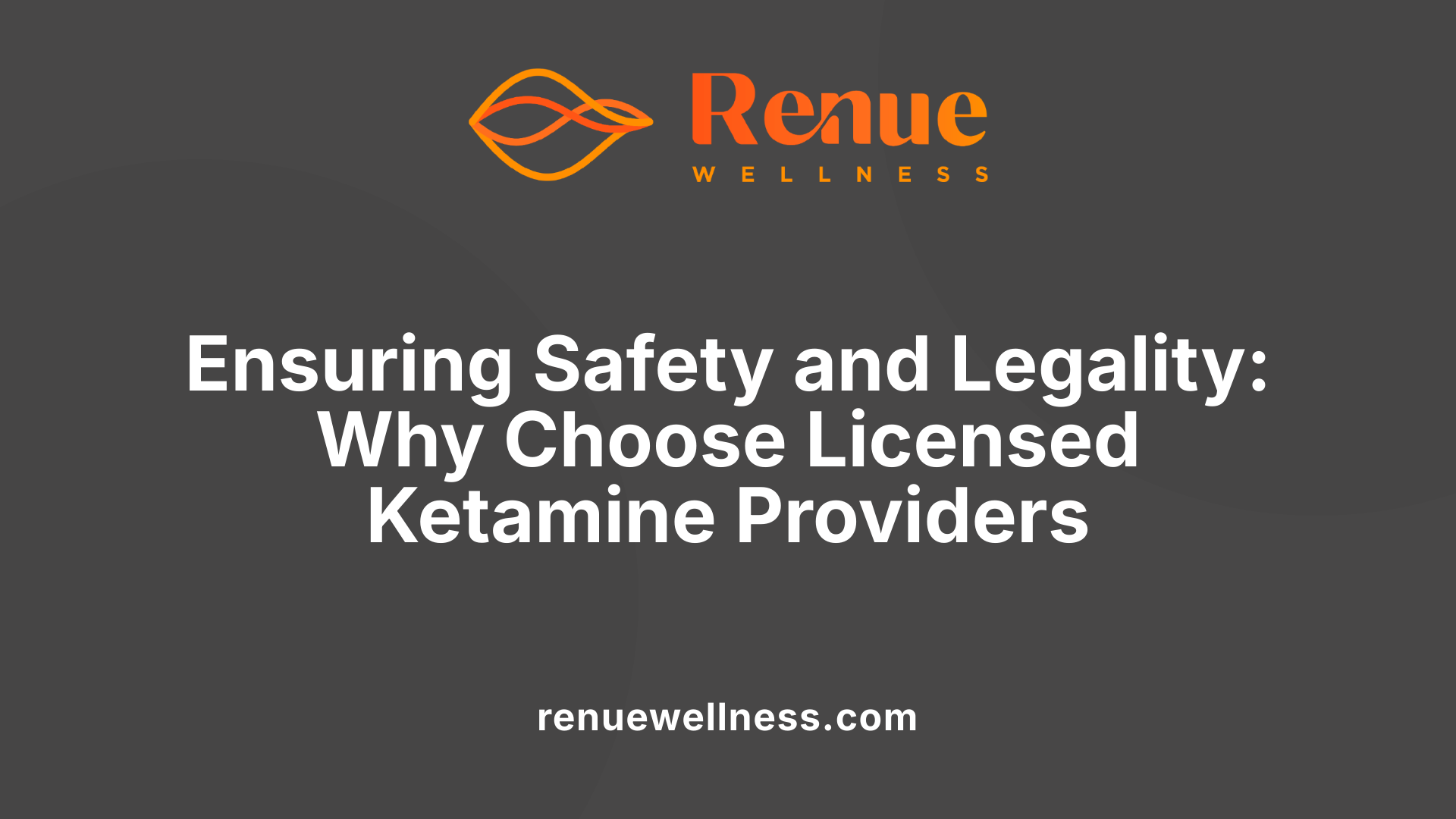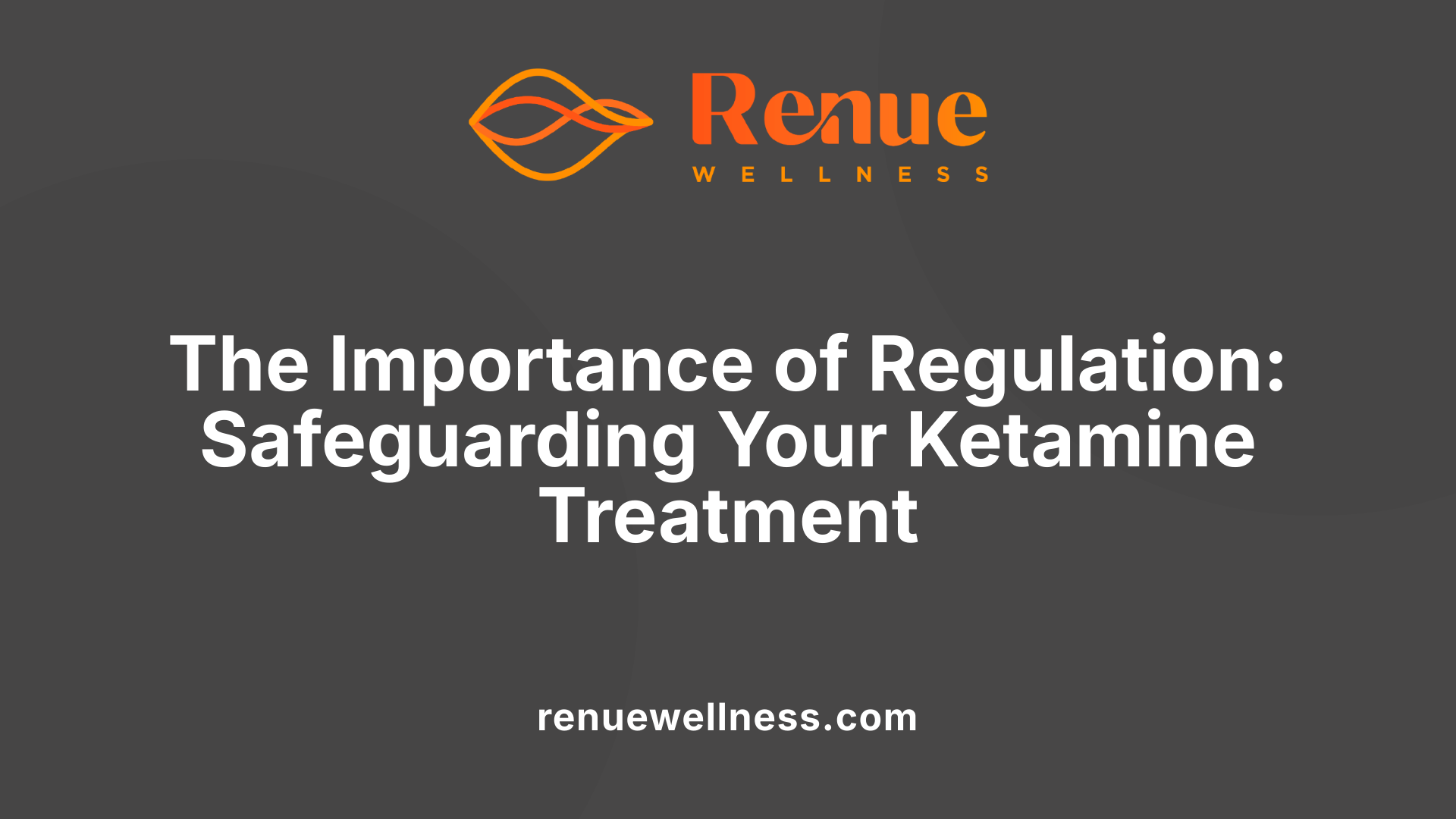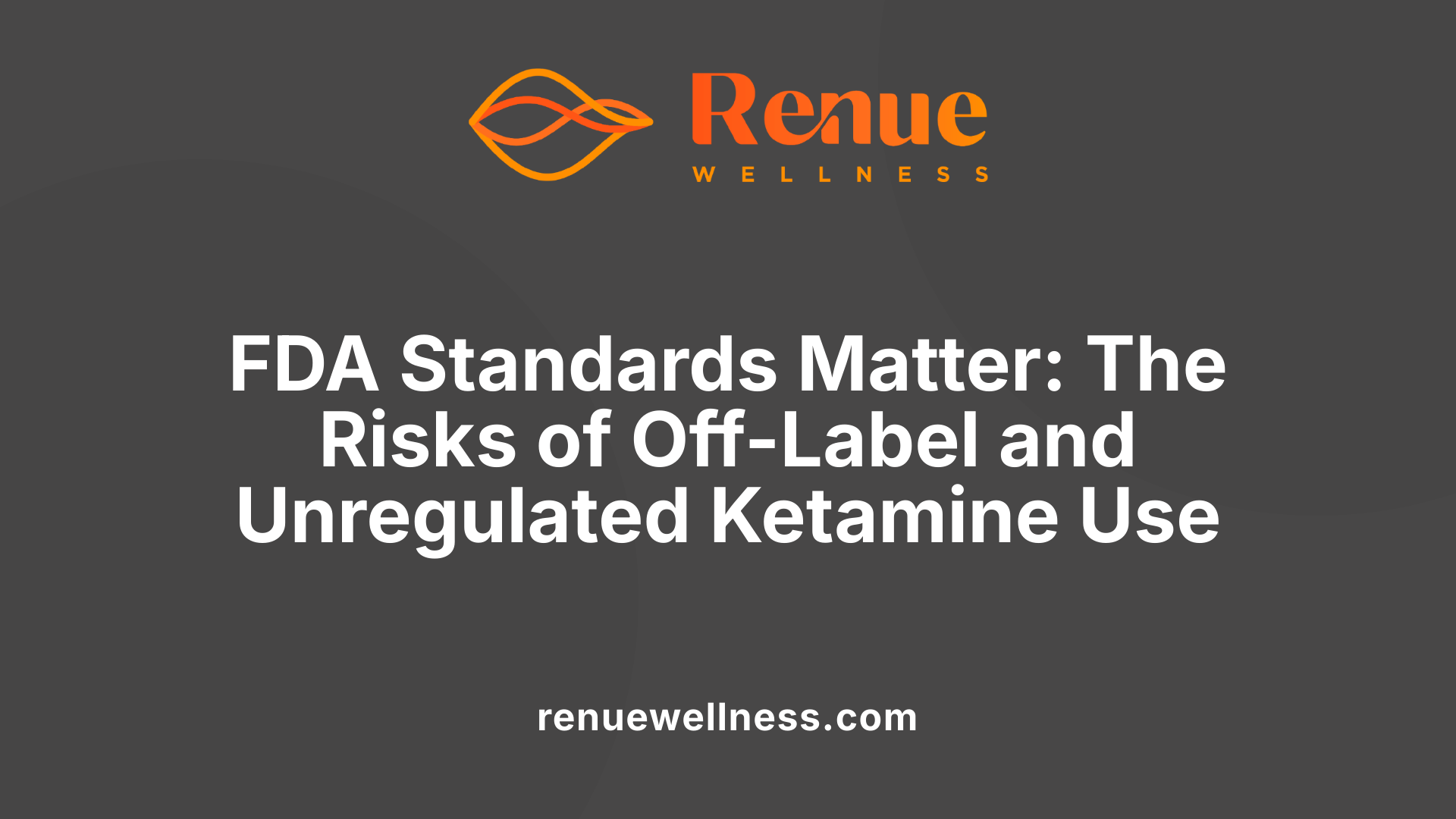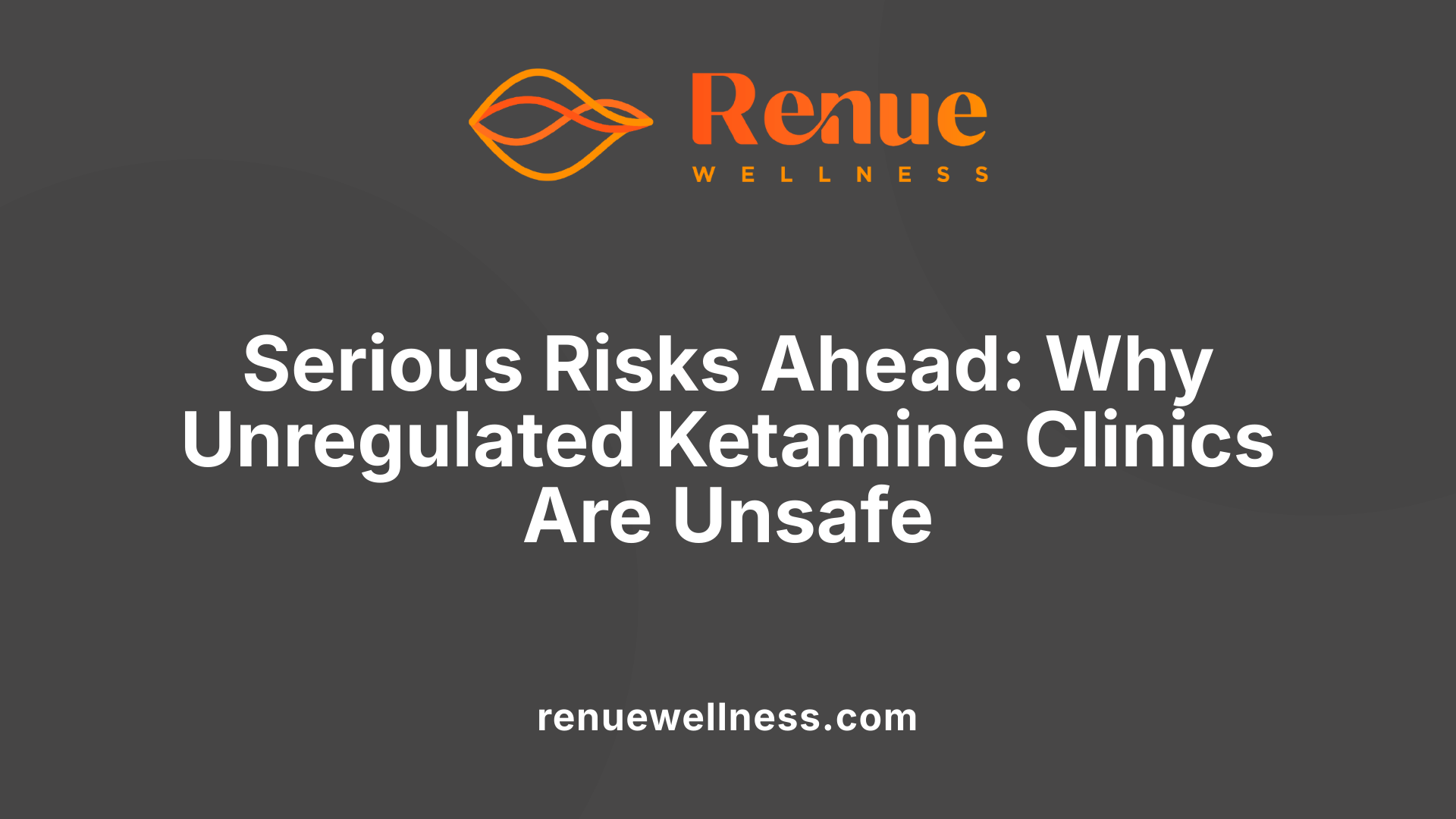Why You Should Avoid Unlicensed Ketamine Treatment Providers


July 23, 2025
Understanding the Risks of Unlicensed Providers in Mental Health Care
With the rising popularity of ketamine therapy for treatment-resistant depression, anxiety, and other mental health conditions, it's crucial for patients to be aware of the dangers posed by unlicensed providers. While regulated treatments have demonstrated safety and efficacy under medical supervision, unlicensed clinics often operate outside the legal and safety frameworks established for patient care. This article explores why choosing licensed providers matters, the risks associated with unregulated treatments, and how to identify red flags to safeguard your health.
Differences Between Licensed and Unlicensed Providers in Safety and Legality

How do licensed ketamine providers differ from unlicensed ones in terms of safety and legality?
Licensed ketamine practitioners are subject to rigorous regulatory oversight, ensuring they follow established safety standards and legal protocols. These providers are typically licensed medical professionals—such as psychiatrists, anesthesiologists, or physicians—who have received specialized training in ketamine administration. They operate within certified clinics or healthcare settings, making sure that each patient undergoes proper screening, dosing, and monitoring.
This oversight is crucial because it reduces the risks associated with improper use. Licensed providers know how to select suitable patients, administer correct dosages, and observe patients for adverse effects. They also ensure treatment occurs within legal frameworks, avoiding illegal or recreational use which can be dangerous.
Conversely, unlicensed or untrained individuals often operate without proper supervision or adherence to safety protocols. They may provide treatments outside legal boundaries, increasing the risk for adverse events like respiratory depression, cardiovascular issues, or dissociation. Unregulated settings often lack necessary monitoring, making complications more difficult to detect and manage.
Using ketamine legally requires that it be administered by qualified, licensed professionals in approved environments. Doing otherwise not only endangers patient safety but also exposes providers to legal liability.
In summary, licensed providers offer safer, supervised, and lawful care that prioritizes patient well-being, while unlicensed practices pose significant risks due to inadequate training and oversight.
Red Flags Indicating Unlicensed or Unscrupulous Providers
 When considering ketamine treatment, patients need to be vigilant about signs that a provider may be operating without proper qualifications or safeguards. One of the most telling red flags is the lack of proper licensing and accreditation. Legitimate clinics are regulated by medical authorities and require licensed medical professionals to administer treatments. Clinics that cannot provide proof of licensure or operate without the necessary DEA registration should raise immediate concern.
When considering ketamine treatment, patients need to be vigilant about signs that a provider may be operating without proper qualifications or safeguards. One of the most telling red flags is the lack of proper licensing and accreditation. Legitimate clinics are regulated by medical authorities and require licensed medical professionals to administer treatments. Clinics that cannot provide proof of licensure or operate without the necessary DEA registration should raise immediate concern.
Another warning sign is the absence of transparent treatment protocols. Reputable providers follow evidence-based procedures, including thorough patient assessments, monitoring, and follow-up. If a clinic offers treatments without clear guidelines or fails to explain the procedures involved, it indicates a lack of adherence to safety standards.
The use of telehealth or at-home treatments without proper oversight is increasingly common but can be dangerous if not conducted within regulated frameworks. Unsupervised use, especially involving compounded or non-FDA-approved ketamine, raises the risk of serious adverse events such as respiratory depression, blood pressure spikes, or dissociation.
Furthermore, the involvement of unqualified staff or non-medical personnel in administering ketamine should be viewed with suspicion. Proper training and medical expertise are essential because ketamine administration involves careful patient selection, dosing, and monitoring to prevent complications.
In summary, patients should avoid clinics that operate outside of legal regulations, lack transparency, utilize unapproved treatment methods, or employ unqualified personnel. These red flags point toward substandard care that can lead to severe health risks and legal issues. Choosing licensed, transparent providers adherent to approved protocols is vital for safe and effective treatment.
The Critical Role of Regulation and Licensing in Ensuring Safety and Efficacy

Why is it important to choose properly licensed and regulated ketamine treatment providers?
Selecting providers that are fully licensed and operate within regulatory frameworks is vital for patient safety and effective care. Licensed clinicians adhere to stringent safety protocols, including comprehensive patient assessment, proper dosing, and continuous monitoring during treatment. This oversight helps prevent adverse events such as respiratory depression, blood pressure fluctuations, or dissociative effects, which can be severe if mishandled.
Regulatory standards also mandate detailed documentation and follow-up, ensuring accountability and quality in each treatment session. Compliance with these protocols minimizes the risk of malpractice, negligence, and legal repercussions, which are often associated with untrained or unauthorized personnel.
Another crucial aspect is the prevention of drug diversion and misuse. Ketamine has abuse potential, especially when used improperly outside medical supervision. Regulations restrict the supply and administration of ketamine to controlled settings, thereby reducing chances of illegal distribution, recreational misuse, or drugs reaching black markets.
Patients benefit most when care is delivered in approved treatment centers that follow evidence-based practices. Such centers are equipped with the necessary safety measures, including emergency response capabilities, and employ staff trained explicitly on patient selection, dosing schedules, and monitoring techniques.
In conclusion, choosing licensed and regulated providers acts as a safeguard against potential harms associated with untrained staff and unapproved treatment environments. It ensures that ketamine treatments are administered responsibly, reducing risks, enhancing therapeutic outcomes, and maintaining legal compliance.
FDA Approval, Safety, and the Risks of Off-Label Use

Why is it crucial to choose FDA-compliant, licensed ketamine providers for safety and efficacy?
Selecting providers who are FDA-compliant and properly licensed is essential for ensuring the safety and success of ketamine treatment. Only certain forms of ketamine, such as the FDA-approved nasal spray esketamine (Spravato), have undergone rigorous testing to confirm their safety and effectiveness for conditions like treatment-resistant depression.
Licensed medical professionals are trained to follow specific protocols that include proper patient selection, dosing, and monitoring during and after treatment. This oversight reduces risks associated with side effects such as high blood pressure, dissociation, or hallucinations.
Unsupervised or off-label use of ketamine—such as at-home treatments or using compounded, non-FDA-approved formulations—lacks the safety nets provided in clinical settings. These unregulated approaches can lead to severe health complications, including overdose, cardiovascular problems, or psychological adverse events.
Furthermore, treatments administered under licensed supervision are supported by scientific evidence and current regulations, ensuring that patients receive care that maximizes benefits while minimizing harm. As ketamine use expands for mental health disorders, it remains crucial that patients only engage with providers adhering to FDA standards and medical best practices. This ensures not only safety but also the therapeutic efficacy of their treatment.
Health Risks and Safety Concerns of Unregulated Clinics

What are the safety concerns and potential health risks of unregulated ketamine clinics?
Unregulated ketamine clinics often operate without the supervision of licensed medical professionals, creating serious safety issues. Without proper oversight, patients are at risk of receiving improper doses that can lead to severe adverse effects. For example, incorrect dosing may cause respiratory depression, blood pressure spikes, or sedation, all of which require immediate medical attention.
Moreover, these clinics often use compounded ketamine products that are not FDA-approved. These unregulated formulations may have inconsistent potency, contamination, or impurities, increasing the chance of overdose and other health problems. The lack of standardization means patients cannot be assured of the medication's safety or effectiveness.
Patients in unlicensed settings also miss out on essential screening and monitoring protocols. Proper patient selection, ongoing assessment, and careful monitoring during treatment are critical to identifying adverse reactions early and adjusting treatment plans accordingly. Absent these measures, the risk of psychological issues such as dissociation, dependence, or misuse greatly increases.
The use of ketamine outside approved medical environments can also lead to serious physical health issues. These include urinary tract problems, cardiovascular disturbances, and neurological effects. Additionally, because these environments lack emergency preparedness, any acute adverse event may not be properly managed.
Overall, unregulated clinics pose significant risks. They operate outside of safety protocols, increasing the chances of harm, dependence, and long-term health consequences. Patients should always seek treatments provided by licensed professionals within regulated settings that follow validated protocols.
Why Unlicensed Ketamine Treatment is Fundamentally Unsafe and Should Be Avoided
Why is unlicensed ketamine treatment considered unsafe and should be avoided?
Unlicensed ketamine treatments are fundamentally unsafe because they lack essential regulation, oversight, and safety standards that protect patients. Unlike FDA-approved treatments, these unregulated options do not undergo rigorous testing for safety and effectiveness. Since ketamine is not officially approved for psychiatric conditions, compounded ketamine products often bypass quality controls, raising concerns about their purity, dosage accuracy, and potential contaminants.
Using these treatments without appropriate medical supervision can result in serious health risks. Patients may experience adverse effects such as sedation, dissociation, rapid increases in blood pressure, respiratory depression, and urinary issues. The FDA has documented safety concerns related to compounded ketamine, including misuse and severe psychiatric events. Moreover, because there are no standardized dosing guidelines or clinical evidence supporting use outside of approved settings, the chance of overdose or inappropriate administration increases.
Regulatory agencies and medical experts stress that safe and effective ketamine therapies require professional oversight. Treatments delivered in controlled environments under the care of licensed practitioners are safer, with monitored dosing, patient screening, and follow-up care. In contrast, unlicensed, at-home, or unsupervised treatments lack these safeguards, increasing the likelihood of adverse outcomes and long-term health consequences.
In summary, the absence of regulation, inconsistent quality, and lack of clinical validation make unlicensed ketamine treatments dangerous. Patients seeking mental health care should prioritize evidence-based, professionally supervised procedures to ensure safety and optimal outcomes.
Risks of At-Home and Unapproved Use of Ketamine
What are the risks of unregulated or unapproved at-home ketamine treatments?
Unregulated or unapproved at-home ketamine treatments carry serious health dangers primarily because they lack medical supervision. Since ketamine is not officially approved by the FDA for psychiatric conditions, the formulations used outside controlled settings—especially compounded products—are not evaluated for safety, dosage, or quality. This means patients are at risk of receiving improper doses, which can lead to overdose or harmful side effects such as respiratory depression, elevated blood pressure, or intense sedation.
Without the protective measures of a formal program like the Risk Evaluation and Mitigation Strategy (REMS), the likelihood of misuse or accidental overdose increases. Patients may also face risks of dependency or misuse, especially if they have a history of substance use disorder. The absence of professional monitoring denies early detection of adverse events, potentially resulting in severe health complications.
Importantly, at-home use often involves unsupervised administration, which can impair cognitive and perceptual functions, making safety during activities like driving or operating machinery even more dangerous.
Overall, the combination of unapproved formulations, lack of supervision, and the potential for misuse greatly amplifies health risks. Safe, effective ketamine therapy requires specialized medical oversight to ensure proper dosing, patient safety, and comprehensive care. Using ketamine outside of regulated healthcare environments undermines established safety standards and can have life-threatening consequences.
Making Safe and Informed Choices in Ketamine Treatment
Given the complex safety profiles, legal restrictions, and the necessity of medical oversight, it is clear that patients should prioritize treatment with licensed, FDA-compliant providers. The risks associated with unlicensed clinics and unregulated at-home treatments are substantial, including overdose, dependence, and other serious health complications. Proper regulation ensures that treatments are administered safely within a controlled, supervised environment, where potential side effects can be managed promptly. Patients are urged to thoroughly verify provider credentials, seek medical guidance, and adhere to established treatment protocols to safeguard their health and maximize the therapeutic benefits of ketamine. Making informed, careful choices is essential in navigating the landscape of emerging mental health therapies.
References
- The Dangers of Untrained Ketamine Providers
- FDA warns about compounded ketamine for psychiatric disorders
- Is Ketamine Therapy Legal? A Guide to Safe and Regulated Treatment
- Ketamine: A Rising Star in Mental Health Treatment
- Ketamine Compliance Consultants & Attorneys - Federal Lawyer
- Ketamine: Handle With Care - Yale School of Medicine
- FDA warns about compounded ketamine for psychiatric disorders
- Risks and Rewards of Low-Dose Ketamine - Consult QD
- Ketamine: Handle With Care - Yale School of Medicine
Recent Posts
Conditions Treated
AnxietyDepressionOCDPTSDPostpartum DepressionPain ManagementSubstance AbuseSuicidal IdeationOur Location


